A list of novels and short stories regarding an invasion, takeover, attack against, or an overwhelming threat to Australia. Also included are some reviews of such stories.
There have been various fictional stories written regarding the defence of Australia and the possible threats against the country. Some of those stories had a basis in fact (e.g. Battle of Sydney, by John Vader), whilst some were purely fictional; however, the latter were often based upon perceived military threats, and may have even been intended to increase the public’s awareness of defence issues.
Although Australia has never been invaded by an enemy army, there were several military actions carried out against the country during the Second World War (1939-1945), the most well-known of which was the aerial bombing of Darwin and the submarine attack in Sydney Harbour.
The possibility of an invasion or a takeover of the nation has intrigued many Australians, and there have been novels published on those themes right up into modern times.
Novels and short stories (full text)
(Arranged by date of publication.)
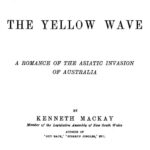 The Yellow Wave [novel by Kenneth Mackay, 1895]
The Yellow Wave [novel by Kenneth Mackay, 1895]
This novel, by Kenneth Mackay (1859-1935), was published in 1895. The story, which includes a military invasion of Australia by Chinese troops (orchestrated by Russia), is set in a time when there were concerns over Russian military intentions towards Britain and the British Empire (including Australia).
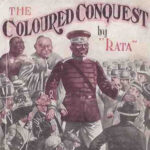 The Coloured Conquest [novel by “Rata” (Thomas Richard Roydhouse), 1904]
The Coloured Conquest [novel by “Rata” (Thomas Richard Roydhouse), 1904]
This novel, by Thomas Richard Roydhouse (1862-1943), using the pseudonym of “Rata”, was published as a serial story in The Albury Banner, and Wodonga Express (from 19 August 1904), the Clarence & Richmond Examiner (from 13 August 1904), The Cootamundra Herald (from 13 August 1904), and The Wyalong Advocate and Mining, Agricultural, and Pastoral Gazette (from 17 August 1904). It was subsequently published as a book in 1904. The basic idea of the story is that Japan, with the backing of many non-white nations, leads a successful conquest of the white nations of the world. The novel’s focus centres on an Australian man and his sweetheart.
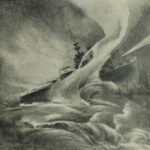 A hero of Babylon [short story by C. A. Jeffries, May 1907]
A hero of Babylon [short story by C. A. Jeffries, May 1907]
This short story, by Charles Adams Jeffries (1869-1931), was published in The Lone Hand (Sydney, NSW), May 1907. It concerns a threat made against Sydney by an Asian naval squadron. Although the attacking country was unspecified, it seems likely that the fictional aggressor was meant to be Japan, given the build-up of the Japanese fleet, and the recent war between Russia and Japan, in the Russo-Japanese War (1904-1905), which Japan won.
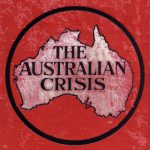 The Australian Crisis [novel by C. H. Kirmess, 1909]
The Australian Crisis [novel by C. H. Kirmess, 1909]
This novel, by Charles H. Kirmess, was originally published as a serial story in The Lone Hand (Sydney, NSW) from October 1908 to August 1909, under the title of “The Commonwealth Crisis”. It was then published as a book in 1909 as The Australian Crisis by Thomas Lothian (Melbourne), George Robertson (Melbourne), and the Walter Scott Publishing Company (London). It is about a Japanese invasion of Australia.
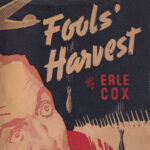 Fools’ Harvest [novel by Erle Cox, 1939]
Fools’ Harvest [novel by Erle Cox, 1939]
This novel, by Erle Cox (1873-1950), was first published as a serial story in The Argus (Melbourne, Vic.) in 1938. It was subsequently published as a book in 1939. It is a story about a fictional invasion of Australia. It was a popular novel, and added to the debate over Australia’s defence preparedness (or lack thereof).
Other invasion and takeover stories
(Arranged by date of publication.)
White or Yellow? A Story of the Race War of A.D. 1908 [serial story by William Lane, 1888]
This serial story, by William Lane (1861-1917), was published in The Boomerang (a weekly newspaper, founded by Lane) from 18 February 1888 to 5 May 1888. It is a story of how Chinese immigrants in Australia make a take-over bid for the country.
See: 1) “White or Yellow? : A Story of the Race War of A.D.1908: novel”, AustLit
2) “William Lane”, Wikipedia
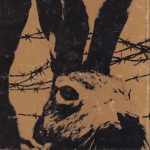 The Year of the Angry Rabbit [novel by Russell Braddon, 1964]
The Year of the Angry Rabbit [novel by Russell Braddon, 1964]
This novel, by Russell Braddon, was published in 1964. It is a tongue-in-cheek story of how Australia becomes a world super-power (indeed, the world’s only super-power), due to its use (and threatened use) of Supermyxomatosis as a biological weapon against all of the other countries of the world. In the story, Supermyxomatosis is developed by Australian scientists to use against a plague of rabbits, but it was soon realised that this devastating virus could also be used against humans. Unfortunately, the law of unintended consequences comes into play, when the virus causes the growth of what could be called “super-rabbits”, who have a devastating effect upon the Land Down Under.
See: 1) The Year of the Angry Rabbit, by Russell Braddon [IAC review]
2) The Year of the Angry Rabbit, Wikipedia
Battle of Sydney [novel by John Vader, 1972]
This novel, by John Vader, was published in 1972. It is an alternative story of World War Two, in which Australia is invaded by Japan. It begins with some chapters based upon historical events, and then morphs into a fictional invasion story. The Japanese land at Darwin and Townsville; there are battles in the northern parts of the country, and all the way down the eastern coast to Sydney.
Below the Line [novel by Eric Willmot, 1991]
This novel, by Eric Willmot, was published in 1991. Australia is invaded by the Indonesians; the top half of the country is occupied and re-named South Irian. The Australian Aborigines are perhaps the real winners in the end (it is relevant to note that the author is of Aboriginal ethnicity).
See: Eric Willmot, Wikipedia
Tomorrow When the War Began [novel by John Marsden, 1993]
This novel, by John Marsden, was published in 1993. Some teenagers head off on a camping trip in a remote bush location. Whilst they are away camping, Australia is invaded by an Asian nation. The teenagers begin a campaign of low-scale guerilla warfare. Although the attacking country is unspecified in the book, many have assumed it to be Indonesia, considering the fears of a possible invasion from that country in the 1990s.
This is the first book in a series of seven novels (the Tomorrow series) written by Marsden; he also wrote another three novels (The Ellie Chronicles), which concentrate on the main character of his invasion books (Ellie Linton). Tomorrow When the War Began was also released as a film (2010) and as a TV series (2016).
See: John Marsden (writer), Wikipedia
Further reading, regarding military actions against Australia:
Air raids on Australia, 1942–1943, Wikipedia
Attack on Broome, Wikipedia
Attack on Sydney Harbour, Wikipedia
Bombing of Darwin, Wikipedia
Leave a Reply